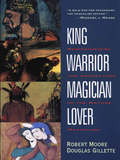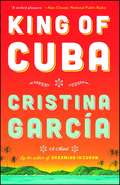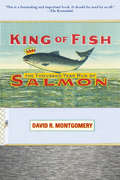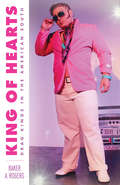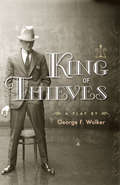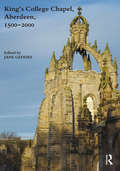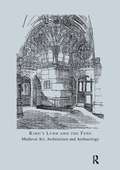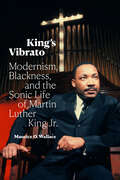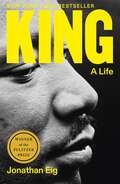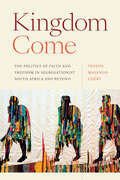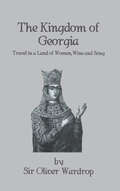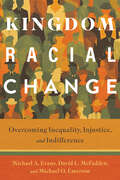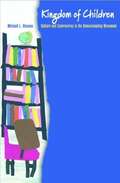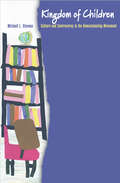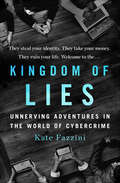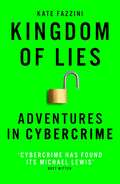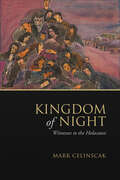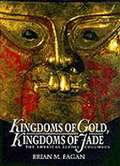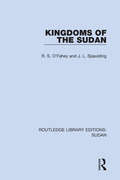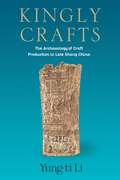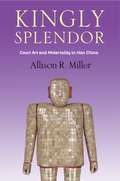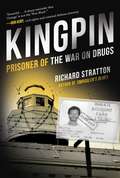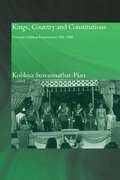- Table View
- List View
King Warrior Magician Lover: Rediscovering the Archetypes of the Mature Masculine
by Robert Moore Douglas GilletteThe bestselling, widely heralded, jungian introduction to the psychological foundation of a mature, authentic, and revitalized masculinity.
King of Cuba
by Cristina GarciaTold with wry wit and keen insight, this entertaining and richly satisfying story about a fictionalized Fidel Castro and an octogenarian Cuban exile obsessed with seeking revenge against the dictator--from the National Book Award finalist and author of Dreaming in Cuban. El Comandante, an aging Castro-like dictator shambles about his mansion in Havana, visits a dying friend, tortures hunger strikers in one of his prisons, and grapples with the stale end of his life that is as devoid of grandeur as his nearly sixty-year-old revolution. Across the waters in Florida, Goyo Herrera, a Miami exile in his eighties, plots revenge against his longtime enemy--the very same El Comandante--whom he blames for stealing his beloved, ruining his homeland, and taking his father's life. Shifting between the two men with great resonance and humor, and peppered with the rabble of other Cuban voices that create a patchwork of history's unofficial stories, García's novel plumbs the passions and realities of these two Cubas--on the island, and off. Writing at the top of her form, García returns to the territory of her homeland and her bestselling novel Dreaming in Cuban.
King of Cuba: A Novel
by Cristina GarciaA "darkly hilarious" (Elle) novel about a fictionalized Fidel Castro and an octogenarian Cuban exile obsessed with seeking revenge by the National Book Award finalist Cristina García, this "clever, well-conceived dual portrait shows what connects and divides Cubans inside and outside of the island" (Kirkus Reviews).Vivid and teeming with life, King of Cuba transports readers to Cuba and Miami, and into the heads of two larger-than-life men: a fictionalized Fidel Castro and an octogenarian Cuban exile obsessed with seeking revenge against the dictator. García's masterful twinning of these characters combines with a rabble of other Cuban voices to portray the passions and realities of two Cubas--on the island and off-- in a pulsating story that entertains and illuminates.
King of Fish: The Thousand-Year Run of Salmon
by David R. MontgomeryThe salmon that symbolize the Pacific Northwest's natural splendor are now threatened with extinction across much of their ancestral range. In studying the natural and human forces that shape the rivers and mountains of that region, geologist David Montgomery has learned to see the evolution and near-extinction of the salmon as a story of changing landscapes. Montgomery shows how a succession of historical experiences -first in the United Kingdom, then in New England, and now in the Pacific Northwest -repeat a disheartening story in which overfishing and sweeping changes to rivers and seas render the world inhospitable to salmon. In King of Fish, Montgomery traces the human impacts on salmon over the last thousand years and examines the implications both for salmon recovery efforts and for the more general problem of human impacts on the natural world. What does it say for the long-term prospects of the world's many endangered species if one of the most prosperous regions of the richest country on earth cannot accommodate its icon species? All too aware of the possible bleak outcome for the salmon, King of Fishconcludes with provocative recommendations for reinventing the ways in which we make environmental decisions about land, water, and fish.
King of Hearts: Drag Kings in the American South
by Baker A. RogersWhile drag subcultures have gained mainstream media attention in recent years, the main focus has been on female impersonators. Equally lively, however, is the community of drag kings: cis women, trans men, and non-binary people who perform exaggerated masculine personas onstage under such names as Adonis Black, Papi Chulo, and Oliver Clothesoff. King of Hearts shows how drag king performers are thriving in an unlikely location: Southern Bible Belt states like Tennessee, Georgia, and South Carolina. Based on observations and interviews with sixty Southern drag kings, this study reveals how they are challenging the region’s gender norms while creating a unique community with its own distinctive Southern flair. Reflecting the region’s racial diversity, it profiles not only white drag kings, but also those who are African American, multiracial, and Hispanic. Queer scholar Baker A. Rogers—who has also performed as drag king Macon Love—takes you on an insider’s tour of Southern drag king culture, exploring its history, the communal bonds that unite it, and the controversies that have divided it. King of Hearts offers a groundbreaking look at a subculture that presents a subversion of gender norms while also providing a vital lifeline for non-gender-conforming Southerners.
King of Thieves
by George F. WalkerNew York City, 1928. Master thief Mac must join an FBI sting operation against a cadre of corrupt bankers. Music, murder, and mayhem ensue, both at the speakeasy where criminals scheme and on Wall Street where financiers conspire. This satirical play with songs exposes the world of corporate crime and, like The Beggar's Opera of 1728 that inspired it, challenges the conservatism that is increasingly apparent today.George F. Walker is one of Canada's most prolific playwrights, having written more than thirty works for the stage since the debut of his first play in 1971. Walker has also spent much of his career writing for radio and television, including for the CBS series Due South and CBC's The Newsroom.
King's College Chapel, Aberdeen, 1500-2000
by Jane GeddesThis new edition is a revised and expanded version of the book produced in 2000 to celebrate the quincentenary of King's College Chapel, Aberdeen. Since then, exciting discoveries have taken place and old ideas have been reappraised. The choir stalls and woodwork have provided a fresh seam of information about the meaning and use of the medieval chapel. Daniel MacCannell has identified new iconography in the stalls. Jane Geddes, prompted by the installation of the new organ, has investigated the original function and appearance of the great pulpitum or screen between the choir and nave and discovered the location of a magnificent lost organ loft. Mary Pryor and John Morrison have examined the great baroque biblical paintings and come up with a totally new interpretation of their iconography and function: a political warning to King Charles II. Easter Smart, the university chaplain, describes the flexible and ecumenical use of the chapel today. The revised edition appears in time to honour the quincentenary of the death of Bishop William Elphinstone, the founder of Aberdeen University, who died in 1514. This book aims to integrate his legacy to the chapel: the liturgy, music, architecture and fittings. Thanks to an unusually tolerant and conservative attitude towards religion at the university following the Reformation, the chapel has survived in a more complete medieval state than any other church in Scotland. The rich archive of university documents show how benign neglect and a fierce pride in their iconic building caused the university to maintain the structure and its furnishings even during the long centuries when it ceased to serve a religious function.
King's Lynn and the Fens: Volume 30 (The\british Archaeological Association Conference Transactions Ser.)
by John McNeillThe fourteen papers collected in this volume explore the medieval art, architecture and archaeology of King's Lynn and the Fens. They arise out of the Association's 2005 conference, and reflect its concern to engage with a broad range of monuments and themes, rather than focusing on a single major building. Within King's Lynn contributors consider the superb 14th-century enamelled drinking vessel popularly known as 'King John's Cup', the former Hanseatic 'Steelyard', the Red Mount Chapel, and the oak furnishings of the chapel of St Nicholas, while the pine standard chest from St Margaret's church is assessed in terms of the importation and distribution of similar chest across England as a whole.Outside King's Lynn there are articles on the historical manipulation of landscapes and buildings at Kirkstead, the 13th-century architecture and sculpture of Croyland Abbey, the 14th-century parish church of St Mary at Snettisham, the tomb of Sir Humphrey de Littlebury at All Saints, Holbeach, the overlooked medieval wall paintings in the Prior's Chapel at Castle Acre, and the late medieval stained glass at Wiggenhall St Mary Magdalen. Finally, there are three papers that look at particular aspects of the ways in which parish churches were financed, embellished and used across the region - in terms of late-12th and early-13th-century patronage, their 12th-century deployment of architectural sculpture, and the types and arrangements of choir stalls that appeared at a parochial level during the later Middle Ages.
King's Vibrato: Modernism, Blackness, and the Sonic Life of Martin Luther King Jr.
by Maurice O. WallaceIn King’s Vibrato Maurice O. Wallace explores the sonic character of Martin Luther King Jr.’s voice and its power to move the world. Providing a cultural history and critical theory of the black modernist soundscapes that helped inform King’s vocal timbre, Wallace shows how the qualities of King’s voice depended on a mix of ecclesial architecture and acoustics, musical instrumentation and sound technology, audience and song. He examines the acoustical architectures of the African American churches where King spoke and the centrality of the pipe organ in these churches, offers a black feminist critique of the influence of gospel on King, and outlines how variations in natural environments and sound amplifications made each of King’s three deliveries of the “I Have a Dream” speech unique. By mapping the vocal timbre of one of the most important figures of black hope and protest in American history, Wallace presents King as the embodiment of the sound of modern black thought.
King: A Life
by Jonathan EigWINNER OF THE 2024 PULITZER PRIZE FOR BIOGRAPHYA finalist for the 2023 National Book Critics Circle Award | Named one of the ten best books of 2023 by The Washington Post, Chicago Tribune, and TimeA New York Times bestseller and notable book of 2023 | One of Barack Obama’s favorite books of 2023One of The New Yorker’s essential reads of 2023 | A Christian Science Monitor best book of the year | One of Air Mail’s twelve best books of 2023A Washington Post and national indie bestseller | One of Publishers Weekly’s best nonfiction books of 2023 | One of Smithsonian magazine’s ten best books of 2023“Supple, penetrating, heartstring-pulling and compulsively readable . . . Eig’s book is worthy of its subject.” —Dwight Garner, The New York Times (Editors’ Choice)“[King is] infused with the narrative energy of a thriller . . . The most compelling account of King’s life in a generation.” —Mark Whitaker, The Washington Post“No book could be more timely than Jonathan Eig’s sweeping and majestic new King . . . Eig has created 2023′s most vital tome.” —Will Bunch, The Philadelphia InquirerHailed by The New York Times as “the new definitive biography,” King mixes revelatory new research with accessible storytelling to offer an MLK for our times.Vividly written and exhaustively researched, Jonathan Eig’s King: A Life is the first major biography in decades of the civil rights icon Martin Luther King Jr.—and the first to include recently declassified FBI files. In this revelatory new portrait of the preacher and activist who shook the world, the bestselling biographer gives us an intimate view of the courageous and often emotionally troubled human being who demanded peaceful protest for his movement but was rarely at peace with himself. He casts fresh light on the King family’s origins as well as MLK’s complex relationships with his wife, father, and fellow activists. King reveals a minister wrestling with his own human frailties and dark moods, a citizen hunted by his own government, and a man determined to fight for justice even if it proved to be a fight to the death. As he follows MLK from the classroom to the pulpit to the streets of Birmingham, Selma, and Memphis, Eig dramatically re-creates the journey of a man who recast American race relations and became our only modern-day founding father—as well as the nation’s most mourned martyr.In this landmark biography, Eig gives us an MLK for our times: a deep thinker, a brilliant strategist, and a committed radical who led one of history’s greatest movements, and whose demands for racial and economic justice remain as urgent today as they were in his lifetime.Includes 8 pages of black-and-white photographs
Kingdom Come: The Politics of Faith and Freedom in Segregationist South Africa and Beyond (Religious Cultures of African and African Diaspora People)
by Tshepo Masango ChéryIn Kingdom Come, Tshepo Masango Chéry charts a new genealogy of early twentieth-century Black Christian activists who challenged racism in South Africa before the solidification of apartheid by using faith as a strategy against global racism. Masango Chéry traces this Black freedom struggle and the ways that South African church leaders defied colonial domination by creating, in solidarity with Black Christians worldwide, Black-controlled religious institutions that were geared toward their liberation. She demonstrates how Black Christians positioned the church as a site of political resistance and centered specifically African visions of freedom in their organizing. Drawing on archival research spanning South Africa, Zimbabwe, Kenya, the United Kingdom, and the United States, Masango Chéry tells a global story of the twentieth century that illuminates the formations of racial identity, state control, and religious belief. Masango Chéry’s recentering of South Africa in the history of worldwide Black liberation changes understandings of spiritual and intellectual routes of dissemination throughout the diaspora.
Kingdom Of Georgia: Notes Of Travel In A Land Of Woman, Wine And Song, To Which Are Appended Historical, Literary, And Political Sketches, Specimens Of The National Music, And A Compendious Bibliography (classic Reprint)
by WardropFirst published in 2008. Routledge is an imprint of Taylor & Francis, an informa company.
Kingdom Racial Change: Overcoming Inequality, Injustice, and Indifference
by Michael O. Emerson Michael A. Evans David L. McFaddenA compelling call to action that weaves together powerful personal stories and keen sociological analysis In this remarkable book, authors Michael Evans, David McFadden, and Michael Emerson combine personal narratives and sociological research to teach Christians how to work together for racial justice. The authors begin by sharing their stories. Michael Evans and David McFadden—friends since grade school—are Black and grew up in the rough neighborhoods of Chicago&’s south side. Michael is a pastor and has ministered in the very neighborhoods where he was raised; David is a medical doctor. The third author—Michael Emerson, who is white—grew up in white communities that were close geographically to his coauthors&’ neighborhoods, but a world away socially. The authors then interpret their experiences through the lens of sociology, drawing on research to explain how injustice can exist on multiple levels. The micro level consists of individuals, relationships, and families; the meso level comprises organizations such as churches and collective activities such as social movements; and the macro level encompasses entire institutions such as the criminal justice system or the educational system, as well as laws and policies. The authors offer practical strategies for pursuing racial justice on all three levels—strategies designed to overcome inequality and draw Christians from diverse backgrounds and circumstances together in the family of God. A compelling call to action, Kingdom Racial Change will engage the hearts and minds of Christians seeking racial righteousness and reconciliation.
Kingdom of Children
by Mitchell L. StevensMore than one million American children are schooled by their parents. As their ranks grow, home schoolers are making headlines by winning national spelling bees and excelling at elite universities. The few studies conducted suggest that homeschooled children are academically successful and remarkably well socialized. Yet we still know little about this alternative to one of society's most fundamental institutions. Beyond a vague notion of children reading around the kitchen table, we don't know what home schooling looks like from the inside. Sociologist Mitchell Stevens goes behind the scenes of the homeschool movement and into the homes and meetings of home schoolers. What he finds are two very different kinds of home education--one rooted in the liberal alternative school movement of the 1960s and 1970s and one stemming from the Christian day school movement of the same era. Stevens explains how this dual history shapes the meaning and practice of home schooling today. In the process, he introduces us to an unlikely mix of parents (including fundamentalist Protestants, pagans, naturalists, and educational radicals) and notes the core values on which they agree: the sanctity of childhood and the primacy of family in the face of a highly competitive, bureaucratized society. Kingdom of Children aptly places home schoolers within longer traditions of American social activism. It reveals that home schooling is not a random collection of individuals but an elaborate social movement with its own celebrities, networks, and characteristic lifeways. Stevens shows how home schoolers have built their philosophical and religious convictions into the practical structure of the cause, and documents the political consequences of their success at doing so. Ultimately, the history of home schooling serves as a parable about the organizational strategies of the progressive left and the religious right since the 1960s.Kingdom of Children shows what happens when progressive ideals meet conventional politics, demonstrates the extraordinary political capacity of conservative Protestantism, and explains the subtle ways in which cultural sensibility shapes social movement outcomes more generally.
Kingdom of Children: Culture and Controversy in the Homeschooling Movement (Princeton Studies in Cultural Sociology #37)
by Mitchell StevensMore than one million American children are schooled by their parents. As their ranks grow, home schoolers are making headlines by winning national spelling bees and excelling at elite universities. The few studies conducted suggest that homeschooled children are academically successful and remarkably well socialized. Yet we still know little about this alternative to one of society's most fundamental institutions. Beyond a vague notion of children reading around the kitchen table, we don't know what home schooling looks like from the inside. Sociologist Mitchell Stevens goes behind the scenes of the homeschool movement and into the homes and meetings of home schoolers. What he finds are two very different kinds of home education--one rooted in the liberal alternative school movement of the 1960s and 1970s and one stemming from the Christian day school movement of the same era. Stevens explains how this dual history shapes the meaning and practice of home schooling today. In the process, he introduces us to an unlikely mix of parents (including fundamentalist Protestants, pagans, naturalists, and educational radicals) and notes the core values on which they agree: the sanctity of childhood and the primacy of family in the face of a highly competitive, bureaucratized society. Kingdom of Children aptly places home schoolers within longer traditions of American social activism. It reveals that home schooling is not a random collection of individuals but an elaborate social movement with its own celebrities, networks, and characteristic lifeways. Stevens shows how home schoolers have built their philosophical and religious convictions into the practical structure of the cause, and documents the political consequences of their success at doing so. Ultimately, the history of home schooling serves as a parable about the organizational strategies of the progressive left and the religious right since the 1960s.Kingdom of Children shows what happens when progressive ideals meet conventional politics, demonstrates the extraordinary political capacity of conservative Protestantism, and explains the subtle ways in which cultural sensibility shapes social movement outcomes more generally.
Kingdom of Lies: Unnerving Adventures in the World of Cybercrime
by Kate Fazzini“Wow. Kate Fazzini is the rare top-level reporter who can make you see, smell and feel a hidden world, not just understand it. Cybercrime (and security) has found its Michael Lewis.” —Bret Witter, co-author of the #1 NYT bestseller The Monuments MenOne of BookRiot's "50 of the Best Books to Read This Summer"In the tradition of Michael Lewis and Tom Wolfe, a fascinating and frightening behind-the-scenes look at the interconnected cultures of hackers, security specialists, and law enforcementA 19-year-old Romanian student stumbles into a criminal ransomware ring in her village. Soon she is extorting Silicon Valley billionaires for millions--without knowing the first thing about computers.A veteran cybersecurity specialist has built a deep network of top notch hackers in one of the world’s largest banks. But then the bank brings in a cadre of ex-military personnel to “help.” A cynical Russian only leaves his tiny New Jersey apartment to hack sports cars at a high performance shop in Newark. But he opens his door to a consultant who needs his help. A hotel doorman in China once served in the People’s Army, stealing intellectual property from American companies. Now he uses his skills to build up a private side-business selling the data he takes from travelers to Shanghai’s commercial center. Kingdom of Lies follows the intertwined stories of cybercriminals and ethical hackers as they jump from criminal trend to criminal trend, crisis to crisis. A cybersecurity professional turned journalist, Kate Fazzini illuminates the many lies companies and governments tell us about our security, the lies criminals tell to get ahead, and the lies security leaders tell to make us think they are better at their jobs than they are.Like Traffic set in the cybercrime world, Kingdom of Lies is as entertaining as it is eye opening.
Kingdom of Lies: Unnerving adventures in the world of cybercrime
by Kate FazziniWould you say your phone is safe, or your computer? What about your car? Or your bank? There is a global war going on and the next target could be anyone – an international corporation or a randomly selected individual. From cybercrime villages in Romania to intellectual property theft campaigns in China, these are the true stories of the hackers behind some of the largest cyberattacks in history and those committed to stopping them. You&’ve never heard of them and you&’re not getting their real names. Kate Fazzini has met the hackers who create new cyberweapons, hack sports cars and develop ransomware capable of stopping international banks in their tracks. Kingdom of Lies is a fast-paced look at technological innovations that were mere fantasy only a few years ago, but now make up an integral part of all our lives.
Kingdom of Night: Witnesses to the Holocaust
by Mark CelinscakIn April 1945, when the Bergen-Belsen concentration camp was surrendered and handed over to the British Army, Canadian forces arrived on scene to provide support, to bear witness, and to document the crimes. They were overwhelmed, understaffed, and left without adequate supplies, equipment, and medicine. Their encounters at the camp were haunting, transformative experiences that forever changed their lives. In Kingdom of Night, Mark Celinscak reveals the engagement of Canadian troops and other personnel at the Bergen-Belsen concentration camp. The book brings together a series of gripping, often deeply moving accounts that demonstrate the critical relief work carried out by Canadians who have been largely overlooked for more than seventy-five years. It outlines in both stark and moving detail what a cross-section of Canadians both said and did during the liberation efforts at one of the most notorious sites in Hitler’s camp system. In addition, biographical overviews are presented for each Canadian featured in the book, not only highlighting some of their life-saving and humanitarian work, but also revealing what ultimately became of their lives after the war. Kingdom of Night depicts the gruelling efforts by those who assisted the victims of one of the greatest crimes in history.
Kingdom of the Sun
by Jacqueline MittonChildren take a wondrous tour of our solar system in this stunning new book that weaves mythology and astronomy in magical ways. Jacqueline Mitton's poetic text explores each planet, comparing its features to those of the Roman god or goddess for whom it was named. Although this naming occurred long before humans had accurate information about the planets, the book points out some remarkable coincidences based on what we know today. The veiled goddess Venus, for example, lends her name to a cloud-veiled planet. And the blue, stormy planet Neptune is named for the god of the sea. This intriguing and highly informative book--a sequel to the same team's best-selling Zoo in the Sky--presents the most up-to-date, scientific details about the planets in an artful way that will stir the minds and imaginations of young readers.
Kingdoms of Gold, Kingdoms of Jade: The Americas Before Columbus
by Brian M. FaganAn account of Mesoamerican civilizations.
Kingdoms of the Sudan (Routledge Library Editions: Sudan)
by R.S. O'Fahey J.L. SpauldingThis book, first published in 1974, is a study of the two states which dominated the northern and western regions of Sudan from the sixteenth to the nineteenth century: the Funj kingdom of Sinnār and the Keira sultanate of Dār Fūr. Until now the history of these two states has been neglected in comparison with that of the western states of the Sudanic Belt. The authors spent years researching the documentation of the period and the present book is a concise survey of their findings, comprising history, literature, politics, economics, trade and religion.
Kingly Crafts: The Archaeology of Craft Production in Late Shang China (Tang Center Series in Early China)
by Yung-ti LiThe site of Anyang, the last capital of the Shang dynasty, dated to around 1200 to 1000 BCE, is one of the most important sources of knowledge about craft production in Bronze Age China. Excavations and research of the settlement over the past ninety years demonstrate both the advanced level of Shang craft workers and the scale and capacity of the craft industries of the time. However, materials unearthed in Anyang by different expeditions have since been stored separately in China and Taiwan, making a thorough study of this important aspect of life in Shang China challenging. Despite efforts to integrate the data based on published material, the physical evidence rarely has been considered as a single group.Through a systematic analysis of the archaeological materials available in both China and Taiwan, Yung-ti Li provides a detailed picture of craft production in Anyang and paves the way for a new understanding of how the Shang capital functioned as a metropolis. Focusing on craft-producing activities, including bronze casting, bone working, shell and marble inlay working, lithic working, and pottery production, Kingly Crafts examines the material remains, the technology, and the production organization of the craft industries. Although the level of Shang craftsmanship can be seen in the finished products, Li demonstrates that it is necessary to study workshop remains and their archaeological context to reconstruct the social and political contexts of craft production. Offering a comprehensive investigation of these remains, Kingly Crafts sheds new light on the relationships between craft industries and political authority in the late Shang period.
Kingly Splendor: Court Art and Materiality in Han China (Tang Center Series in Early China)
by Allison R. MillerThe Western Han dynasty (202 BCE–9 CE) was a foundational period for the artistic culture of ancient China, a fact particularly visible in the era’s funerary art. Iconic forms of Chinese art such as dazzling suits of jade; cavernous, rock-cut mountain tombs; fancifully ornate wall paintings; and armies of miniature terracotta warriors were prepared for the tombs of the elite during this period. Many of the finest objects of the Western Han have been excavated from the tombs of kings, who administered local provinces on behalf of the emperors.Allison R. Miller paints a new picture of elite art production by revealing the contributions of the kings to Western Han artistic culture. She demonstrates that the kings were not mere imitators of the imperial court but rather innovators, employing local materials and workshops and experimenting with new techniques to challenge the artistic hegemony of the imperial house. Tombs and funerary art, Miller contends, functioned as an important vehicle of political expression as kings strove to persuade the population and other elites of their legitimacy. Through case studies of five genres of royal art, Miller argues that the political structure of the early Western Han, with the emperor as one ruler among peers, benefited artistic production and innovation. Kingly Splendor brings together close readings of funerary art and architecture with nuanced analyses of political and institutional dynamics to provide an interdisciplinary revisionist history of the early Western Han.
Kingpin: Prisoner of the War on Drugs (Cannabis Americana #2)
by Richard StrattonThis fast-paced sequel to Smuggler's Blues is a harrowing and at times comical journey through the criminal justice system at the height of America's War on Plants.Captured in the lobby of the Sheraton Senator Hotel at LAX following a fifteen-year run smuggling marijuana and hashish as part of the hippie mafia, Richard Stratton began a new journey. Kingpin tells the story of the eight years that followed, through two federal trials and the underworld of the federal prison system, at a time when it was undergoing unprecedented expansion due to the War on Drugs. Stratton was shipped by bus from LA' s notorious Glass House to jails and prisons across the country, a softening process known as diesel therapy. Resisting pressure to falsely implicate his friend and mentor, Norman Mailer, he was convicted in his second trial under the kingpin statute and sentenced to twenty-five years without the possibility of parole.While doing time in prisons from Manhattan's Criminal Hilton to rural Pennsylvania, Virginia, Kentucky, and New York, he witnessed brutality as well as camaraderie, rampant trafficking of contraband, and crimes by both guards and convicts. He first learned the lessons of survival. Then he learned to prevail, becoming a jailhouse lawyer and winning the reversal of his kingpin sentence and eventual release.Kingpin includes cameos by Norman Mailer and Muhammad Ali, and an account of the author's friendship with mafia don Joe Stassi, a legendary hitman from the early days of the mob who knew gangsters Meyer Lansky, Bugsy Siegel, and Abe Zwillman and has insights into the killing of Dutch Schultz and the Kennedy assassinationKingpin is the second volume in Richard Stratton's trilogy, Remembrance of the War on Plants.
Kings Countries & Constitutions - SEA NIP: Thailand's Political Development 1932-2000
by Kobkua Suwannathat-PianProviding a detailed analysis of Thailand's political development since 1932, when Thailand became a constitutional monarchy, until the present, this book examines the large number of different versions of the constitution which Thailand has had since 1932, and explains why the constitution has been subject to such frequent change, and why there have been so many outbursts of violent, political unrest. It explores the role of the military, and, most importantly, discusses the role of the monarchy, which, as the author shows, has been crucial in holding Thailand together through the various changes of regime. The author brings to light original and largely unseen documents from the Public Records Office and US National Archives, as well as drawing upon her extensive knowledge of politics in Thailand.
